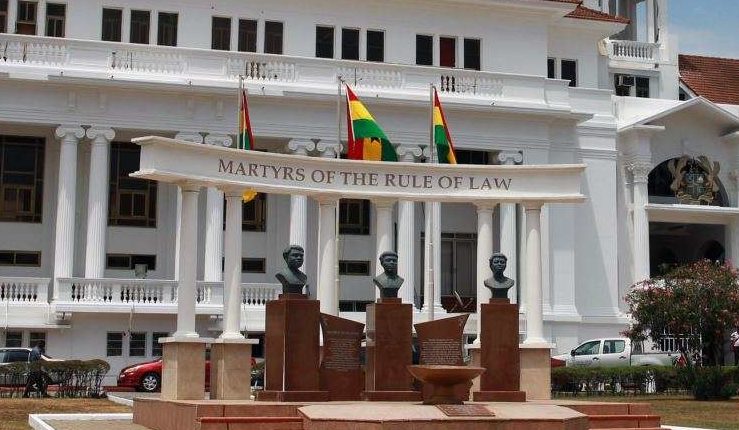SC to rule on High Court’s order to re-collate parliamentary results Friday
On Friday, December 27, the Supreme Court of Ghana will decide whether a High Court ruling, which authorized the Electoral Commission (EC) to re-collate parliamentary election results in six constituencies, should stand. The case has stirred significant debate and raised important questions about the legal principles governing fairness, transparency, and the right to be heard in the judicial process.
Background to the case
The drama began following Ghana’s parliamentary elections, which concluded on December 7, 2024. Voting for the six contested constituencies—Okaikwei Central, Ablekuma North, Nsawam-Adoagyiri, Tema Central, Techiman South, and Ahafo Ano North—wrapped up by 5 p.m. that day. The results were subsequently collated and declared, with the National Democratic Congress (NDC) candidates emerging victorious in all six constituencies.
However, just ten days later, on December 17, the New Patriotic Party (NPP) parliamentary candidates from these constituencies filed separate applications in the High Court in Accra. They sought an order compelling the EC to re-collate the election results, claiming discrepancies that might have impacted the integrity of the results.
All six cases were consolidated and brought before one High Court judge—Rev. Fr. Justice Joseph Agyemang of General Jurisdiction 13. What followed has sparked a legal controversy: The judge’s ruling, issued on December 20, authorized the EC to re-collate the results but did so without allowing the NDC parliamentary candidates, who had been declared winners, to participate in the proceedings.
The NDC MPs’ exclusion
The core issue in this case is the principle of natural justice, which mandates that no one should be adversely affected by a legal decision without having the opportunity to present their side of the story. Despite this fundamental rule, the NDC candidates—whose election results were in question—were not included in the legal proceedings.
Upon hearing about the NPP’s applications, the NDC candidates immediately sought to join the case, filing a formal request with the High Court on December 20. Their lawyers argued that they should be allowed to defend their victory, given that the judge’s final decision would directly affect their status as elected Members of Parliament.
Yet, in a move that has been widely criticized, Rev. Fr. Justice Agyemang rejected their request. The NDC MPs were present in court, but the judge refused to permit them to join the case, stating that the urgency of the matter outweighed their right to be heard. He further noted that Parliament’s swearing-in was scheduled for early January 2025, underscoring the need for prompt action to ensure appropriate representation in Parliament.
The controversial decision
In his rulings, the judge emphasized the urgency of the matter, stating that any delay could hinder the timely representation of the constituencies in question. He said: “Joinder Application at this stage should not operate as a setback on this [NPP] Application because of the urgent nature of the circumstances of this case.”
However, this decision has raised eyebrows within the legal community, as the judge’s refusal to hear the NDC MPs’ side has been seen as a violation of their right to fair representation. Critics argue that the court’s approach undermines the foundational principle of due process in legal matters.
The Supreme Court’s role
As the case moves to the Supreme Court, the central question will be whether Rev. Fr. Justice Agyemang’s orders should stand. The NDC MPs argue that the High Court judge’s refusal to allow them to present their side of the case is a blatant disregard for their legal rights and could set a dangerous precedent for future election disputes.
The Supreme Court’s ruling will not only have significant implications for the six constituencies involved but could also influence the broader legal landscape concerning electoral disputes in Ghana. A decision in favor of the NPP could affirm the re-collation of results, while a ruling in favor of the NDC MPs could reinforce the importance of due process and fairness in legal proceedings, especially when the results of a national election are at stake.
What’s at stake?
For the NDC MPs, the stakes are incredibly high. If the Supreme Court upholds the High Court’s decision, their victories in the December 2024 elections could be invalidated, leading to re-collation and possibly a re-run of the elections in the affected constituencies. On the other hand, if the Supreme Court rules in their favor, it would affirm the principle that all parties in an election dispute must be given a fair chance to present their case before any legal decision is made.
With Ghana’s disputed parliamentary elections results, the Supreme Court’s verdict will be closely watched. It has the potential to shape not only the political landscape in the contested constituencies but also the broader integrity of the nation’s electoral system.
The legal battle over these six constituencies may very well set the tone for how electoral disputes are handled in the future, particularly in the delicate period immediately following a contested election. As the Friday December 27, 2024 hearing approaches, all eyes are on the highest court in the land, waiting for clarity on whether the NDC’s voice will finally be heard in this crucial matter.


DONATION TO SUPPORT THIS WEBSITE: 0599896099 +233599896099 Thank you for your contribution!
Related




















































